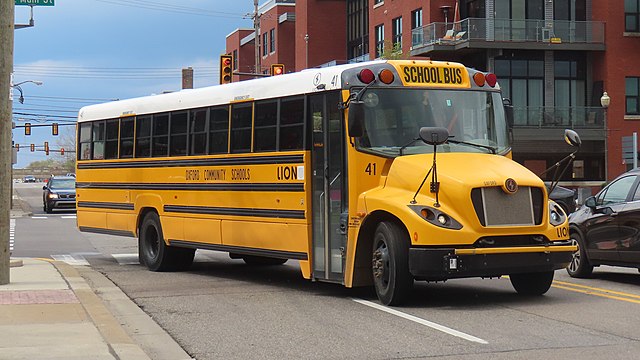District granted funds for electric school buses
“Oxford Community Schools 2020 Lion Electric LionC 41” by 42-BRT is licensed under CC BY-SA 4.0
The Lion Electric Company is the vendor that will manufacture the 25 electric buses Atlanta Public Schools has been granted.
May 24, 2023
Atlanta Public Schools has been awarded $9.9 million in federal funds to purchase 25 electric school buses as part of the U.S. Environmental Protection Agency’s $5 billion Clean School Bus Rebate Program.
Midtown is one of 389 school districts nationwide and 15 in Georgia selected for this program, which aims to replace existing school buses with zero-emission and low-emission archetypes over the next five years, and was created through the 2021 Bipartisan Infrastructure Law. APS plans to put the 25 electric buses in service at the beginning of the 2024-2025 school year.
Congresswoman Nikema Williams, who announced the investment on May 2 at APS’ Dunbar Elementary School, said the program reflects both the national and citywide push for equity sparked by the Biden-Harris administration, which she said addresses the disparate impacts of pollutants on individuals.
“The Biden-Harris administration is looking at all of the policy-making decisions through a lens of equity, and this is no different [than Atlanta],” Williams said. “When we think about the signature plan that President Biden initially had – Built Back Better – it was never about just going in and addressing where things currently are, but [instead] how we can look at making the playing field level and then advancing from there.”
The grant APS is receiving comes from only the first round of funding from the rebate program. Williams said it will provide the district with their money back only after the purchase of the electric buses and accompanying bases.
“APS can purchase the electric buses, charging stations and other eligible infrastructure right now, and that’s outlined in the grant,” Williams said. “Then, the school district will provide the documentation to the EPA that they purchased the eligible buses, equipment and infrastructure, and they’ll get reimbursed up to [almost $10 million]. So, this is one of those rebates where you don’t want to lose the documentation because there’s almost $10 million at stake here.”
Williams feels as though the investment into the electric buses will not only improve the environment by reducing Atlanta’s overall carbon footprint but will also in turn improve educational outcomes for students.
“Having those electric buses is going to be an opportunity for more students to spend time outdoors,” Williams said. “It will lead to a cleaner environment and more learning from our students, who will spend less time out of school with illnesses, like asthma, that are exacerbated because of pollutants in the air. Our vehicles on the road and buses are some of the biggest emitters of pollutants, and so this [program] is a big opportunity for us to address that so we can increase student learning.”
Junior Julian Ender has been riding school buses to and from school throughout his time at Midtown. He feels as though electric school buses would be beneficial in reducing air and noise pollution in the Midtown community.
“There’s still somewhat bad air pollution in Midtown in general, and it’s always nice to lessen that [through replacing fossil fuels], regardless of how noticeable it currently is,” Ender said. “As for the noise of the buses, school buses are very loud machines, especially when they start and stop; I think everyone knows the almost hydrologic sound of it. I know a lot of people don’t like all of the road noise, and so [electric buses] would be good for them.”
Ender also believes the 25 electric buses may not result in an immediate noticeable environmental impact, but will likely be beneficial over time.
“What [the investment] does is it shows that we have a willingness to change, and by starting smaller changes, we promote an environment where we can see more stuff like this,” Ender said. “This promotes school buses being electric in general, instead of maybe some electric and some diesel. Once you have that environment where people are more used to the notion of electric vehicles as a whole, then I think you can open some people’s eyes to the benefits of electric transportation.”
Additionally, Ender believes this is the appropriate time for upgrades to be made to the district’s transportation regardless of the environment.
“I think part of what we just need is new buses in general because a lot of our current buses [are falling apart],” Ender said. “My bus (#635) broke down around October, and we have not had that same bus since. I think all of the school buses tend to do that, as they’re very large vehicles which are not super reliable, and we don’t have amazingly funded transit systems.”
Freshman Maya Gordon rides the bus daily and agrees with Ender’s idea concerning the snowball effect, and, similar to Williams’ sentiment, feels as though educational outcomes will improve due to the environmental benefits of the electric buses on students directly.
“While 25 school buses in a larger city won’t have much of an impact on the environment, it could be seen as an influence to increase the number of electric buses if students enjoy them more,” Gordon said. “By reducing noise pollution and creating a more peaceful environment for students, I believe that electric buses are important for educational outcomes, by helping [students] focus better.”
Ender also believes electric school buses will uniquely result in better educational opportunities by promoting expanded transportation in public schools.
“We have a lot of students who don’t have a means of transportation because their family is below a certain income level,” Ender said. “I think investing in electric buses and expanding the school transit system, in general, is good. We should be giving more opportunities for students like that to seek education and better themselves, and I think electric infrastructure is a good way to do that because it promotes the city to do more.”
Williams is also a mother of an APS student and said she is always looking for what is going to have long-term impacts on the youth. She believes the investment in electric buses will bring about equity and advancement in the future.
“[This program] still goes back to environmental justice and making sure that students who have been in neighborhoods that have been disproportionately impacted have opportunities,” Williams said. “So, [this program] is an opportunity for us to normalize electric vehicles that are going to have a huge impact on our environment, and in turn, on our health outcomes.”







